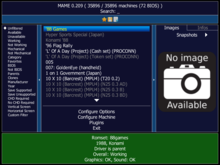 | |
 MAME's main menu (as of version 0.209) | |
| Original author(s) | Nicola Salmoria |
|---|---|
| Developer(s) | The MAME community |
| Initial release | 5 February 1997 |
| Stable release | 0.271 (October 31, 2024)
|
| Repository | |
| Written in | C++ (C and Python for some drivers) |
| Operating system | Windows, macOS, Linux, BSD, Amiga, etc. |
| Type | Emulator |
| License | GPL-2.0-or-later, with some sub-parts BSD-3-Clause.(for versions since 0.172) Original MAME license (for versions prior to 0.172) |
| Website | www |
MAME (formerly an acronym of Multiple Arcade Machine Emulator) is a free and open-source emulator designed to recreate the hardware of arcade games, video game consoles, old computers and other systems in software on modern personal computers and other platforms.[1] Its intention is to preserve gaming history by preventing vintage video games from being lost or forgotten. It does this by emulating the inner workings of the emulated machines; the ability to actually play the video games is considered "a nice side effect".[2] Joystiq has listed MAME as an application that every Windows and Mac gamer should have.[3]
The first public MAME release was by Nicola Salmoria on 5 February 1997. It now supports over 7,000 unique games and 10,000 actual ROM image sets,[citation needed] though not all of the games are playable. MESS, an emulator for many video game consoles and computer systems, based on the MAME core, was integrated into MAME in 2015.
With OTVDM (WineVDM) a version of MAME is available to emulate 16-Bit DOS and Windows applications on x64 and AArch64 versions of Windows. The NTVDM from Microsoft is only supported for the 32-bit versions of Windows.[4][5][user-generated source?]
- ^ Herz, J.C. (5 March 1998). "With Software Sleight of Hand, Video Ghosts Walk". The New York Times. Archived from the original on 14 April 2019. Retrieved 3 July 2013.
- ^ "MAME | About MAME". Mamedev.org. Retrieved 11 April 2011.
- ^ Quilty-Harper, Conrad (16 December 2005). "PC and Mac Applications that Every Gamer Should Have". Joystiq. Archived from the original on 6 January 2006. Retrieved 3 July 2013.
- ^ "Virtual DOS machine", Wikipedia, 8 March 2023, retrieved 25 March 2023
- ^ "WineVDM - Emulation General Wiki". emulation.gametechwiki.com. Retrieved 25 March 2023.